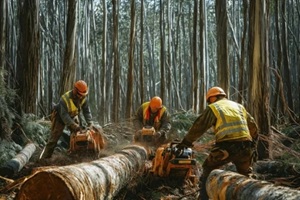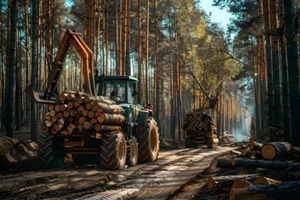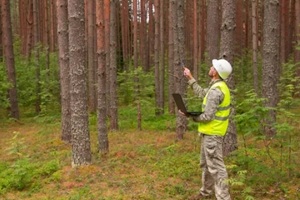
Natural disasters are one of nature’s most unpredictable offerings. Whether through hurricanes, tornadoes, wildfires, or something else, any region is susceptible to catastrophic natural force. This can make forestry jobs especially challenging (on top of the already risky work these professionals do).
The good news is that forestry insurance can help mitigate the financial disasters of nature’s fury on the job site and company-owned property. However, taking advantage of insurance coverage requires forestry businesses to select the right policies, choose the correct coverage amounts, and understand the exclusions.
Here are some recommendations for the policies forestry business owners should consider to protect against natural disasters, pests, and other environmental hazards that threaten their work.
Forestry Natural Disaster Coverage
Forestry workers will never be able to tell which type of natural disaster might impact their work until the weather worsens or their job becomes impacted. At this point, it is too late to select insurance coverage. The main policies that forestry businesses should consider before disaster strikes include:
Business Interruption
When a wildfire or other weather event ravages a tract of land on which your workers are logging or performing other tasks, it can quickly become too hazardous or difficult to continue their jobs. Business interruption insurance can cover the costs of waiting until the weather passes, such as paying to extend the rental period for logging equipment or continuing to compensate workers in the interim.
Equipment
Machinery is one of the most essential properties a forestry business owns, and it faces significant danger during natural disasters. Wildfires can burn out even the hardiest equipment, floods can wash it away or make it unusable, and landslides can destroy or make using it impossible.

When something happens to a business’ forestry equipment, insurance that explicitly covers these machines is valuable. Do not forget to review the exclusions of any equipment policy, as weight or value may impact what is covered in a basic offering.
Workers’ Compensation
Most forestry businesses must carry workers’ compensation insurance, but reviewing the details in light of natural disaster coverage is helpful. Minimum protections might save the company money, but they can be costlier in the long run when a natural disaster harms or even kills someone.
Pest Protection in Forestry
One area that many forestry businesses fail to consider when selecting their insurance coverage is the unspoken natural disaster: pests. Emerald ash borers and other bug infestations can destroy trees, completely undercutting the value of the timber a forestry company was counting on. While insurance cannot make pests go away, it can help businesses recover from the financial impact of their activity.
Cargo
Once a truck is loaded with freshly harvested timber and sent on its way, many teams will sigh with relief; the hard part is over. However, experienced loggers and forestry professionals know the lumber is far from safe. Cargo insurance can address potential damage or loss of the wood as it travels, but the policy details should be examined.
The best forestry insurance will include protection from pests during this stage when the tree’s protective bark is often damaged or stripped entirely. Pests ranging from bugs to small vermin can chew into the timber and reduce its value.
Forestry Insurance

Timberland insurance is a niche of forestry insurance that can address the land tract on which a team works. Should a wave of pests such as borer beetles overtake a tract before the trees can be harvested, this insurance policy can pay for the lost business, unmet expectations, and costs of finding a new area to work.
However, keep in mind that insurance covering standing timber is one of the most difficult to find, so it is essential to partner with an insurance agency familiar with forestry work. More generalized providers will likely be unable to meet the business needs regarding natural disaster protection.
Keep Your Forestry Company Protected
Forestry businesses have plenty of hazards to think about, and natural disasters rank high on that list. However, because such events cannot be predicted, preparing for them in advance is the best option.
Carefully train your team on safety protocols, make smart decisions about when to call off work due to weather, and work with an insurance agency experienced in forestry to secure the best coverage for your business. Contact Burton & Company today to receive an insurance package customized to the exclusive risks your business is facing.

